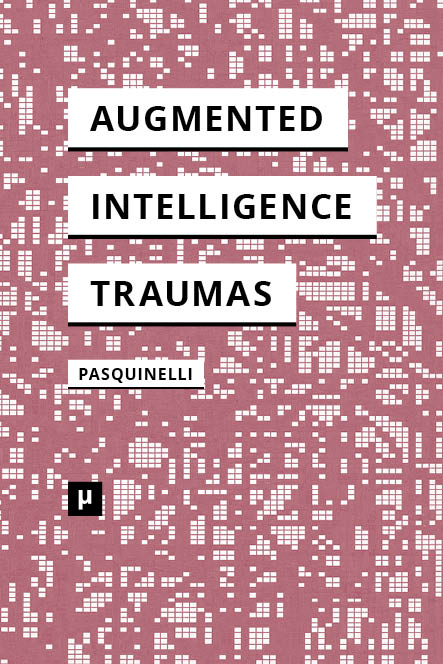Matteo Pasquinelli (ed.): Gli algoritmi del capitale. Accelerazionismo, macchine della conoscenza e autonomia del comune (2014) [Italian]
Filed under book | Tags: · accelerationism, algorithm, capitalism, philosophy, politics, theory

“L’immaginario politico e l’idea di futuro sembrano oggi cancellati dall’imperativo dell’austerity. Ma quale sarebbe il vero passaggio rivoluzionario, si chiedevano un tempo Deleuze e Guattari: ritirarsi dal mercato globale o, al contrario, andare ancora più lontano, “accelerare il processo”? L’economia è in crisi, ma la tecnologia continua a evolvere sotto i nostri occhi: i social network sono sempre più pervasivi, la logistica delle merci sempre più veloce e digitalizzata, servizi segreti e finanza usano algoritmi sempre più sofisticati per analizzare e prevedere i comportamenti di massa. E se l’impasse politica fosse legata all’incapacità di comprendere le nuove astrazioni del capitale e del lavoro, gli algoritmi che controllano le relazioni sociali tanto quanto il tempo collettivo congelato dalla finanza in futures e derivati? Un nuovo nomos tecnologico sembra prendere forma a livello planetario, dove i poteri tradizionali degli Stati nazione si intrecciano con le grandi corporation della rete. Un ex direttore della Cia lo ha riassunto in modo cinico ma efficace: “Uccidiamo persone sulla base dei metadati”. Rispondendo al recente Manifesto accelerazionista e rilanciando la tesi del capitalismo cognitivo, gli autori del presente libro sostengono che lo sviluppo tecnologico possa essere ridisegnato in senso rivoluzionario, che l’astrazione più estrema dell’intelligenza debba diventare arma politica e che il futuro sia da riconquistare come terreno visionario.”
Contributors: Alex Williams & Nick Srnicek, Antonio Negri, Franco “Bifo” Berardi, Matteo Pasquinelli, Nick Dyer-Witheford, Mercedes Bunz, Stefano Harney, Tiziana Terranova, Carlo Vercellone, and Christian Marazzi.
Publisher Ombrecorte, Verona, 2014
ISBN 9788897522829
187 pages
Reviews: Andrea Fumagalli (Il manifesto, 2014), Valerio Mattioli (Prismo, 2015), Elettra Stimilli (Alfabeta2, 2015).
Comment (0)Computational Culture, 5: Rhetoric and Computation (2016)
Filed under journal | Tags: · algorithm, code, computation, language, machine, philosophy, rhetoric, semantics, software studies, theory
“How can machines be rhetorical? The readers of Computational Culture need not be convinced that computation drives the digital and networked spaces in which we interact, argue and communicate: word processing programs, videogames, banking and commerce systems, social networking sites, and smartphone apps that track our data (both with and without our knowledge) are all evidence that computation in code shapes nearly every space we inhabit. Computation in code affects and effects our lives. Computational machines affect us through their programming and design, as well the discourse they can generate, via text, image, sound, and so on. By writing computer code and software, programmers and designers construct machines that make arguments and judgments and address audiences both machinic and human. In this sense, even the most mundane computational technologies can be seen as rhetorical –from the grocery store check-out scanner to the high school graphing calculator–because any computational machine shapes and constrains behavior. […]
Software studies has paved the way for many disciplines to approach software as an object of study and computer programs as written artifacts, and we may add rhetoric to our toolkit to do so. We can use rhetoric to interpret the ways that computation addresses and responds to various audiences and exigencies, makes assertions about identities, and ultimately participates in a complex ecology of forces that shape behavior and perception. This version of rhetoric is more expansive than the limited, Aristotelian definition rhetoric as the ‘available means of persuasion.’ Just as software studies recognizes that software is more than code, and that code is more than ones and zeros, contemporary rhetoric is interested in more than the content of arguments; it also concerns the relational forces that precede and exceed arguments.” (from the introduction)
With thematic texts by Steve Holmes, John Tinnell, Kevin Brock, Elizabeth Losh, Jennifer Maher, Alexander Monea, Andreas Birkbak & Hjalmar Bang Carlsen, Matthew Bellinger; articles by M. Beatrice Fazi, Erica Robles-Anderson and Patrik Svensson, Michael Lachney, William Babbitt & Ron Eglash, and review section.
Edited by Annette Vee and James J. Brown, Jr.
Published in January 2016
Open Access
ISSN 2047-2390
Matteo Pasquinelli (ed.): Alleys of Your Mind: Augmented Intelligence and Its Traumas (2015)
Filed under book | Tags: · algorithm, artificial intelligence, brain, cognition, computation, cybernetics, technology, thinking

“One day, it will not be arbitrary to reframe twentieth century thought and its intelligent machines as a quest for the positive definition of error, abnormality, trauma, and catastrophe—a set of concepts that need to be understood in their cognitive, technological and political composition. It may be surprising for some to find out that Foucault’s history of biopower and technologies of the self share common roots with cybernetics and its early error friendly universal machines. Or to learn that the desiring machines, which “continually break down as they run, and in fact run only when they are not functioning properly” (Deleuze and Guattari), were in fact echoing research on war traumas and brain plasticity from the First World War. Across the history of computation (from early cybernetics to artificial intelligence and current algorithmic capitalism) both mainstream technology and critical responses to it have shared a common belief in the determinism and positivism of the instrumental or technological rationality, to use the formulations of the Frankfurt School. Conversely, the aim of this anthology is to rediscover the role of error, trauma and catastrophe in the design of intelligent machines and the theory of augmented cognition. These are timely and urgent issues: the media hype of singularity occurring for artificial intelligence appears just to fodder a pedestrian catastrophism without providing a basic epistemic model to frame such an “intelligence explosion”.”
With texts by Benjamin Bratton, Orit Halpern, Adrian Lahoud, Jon Lindblom, Catherine Malabou, Reza Negarestani, Luciana Parisi, Matteo Pasquinelli, Ana Teixeira Pinto, Michael Wheeler, Charles Wolfe, and Ben Woodard.
Publisher meson.press, Lüneburg, November 2015
Creative Commons BY-SA 4.0 License
ISBN 9783957960658 (print) 9783957960665 (PDF)
212 pages

